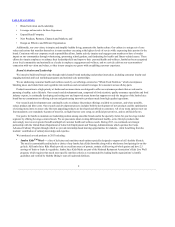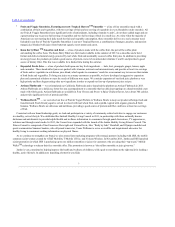Jamba Juice 2013 Annual Report Download - page 15
Download and view the complete annual report
Please find page 15 of the 2013 Jamba Juice annual report below. You can navigate through the pages in the report by either clicking on the pages listed below, or by using the keyword search tool below to find specific information within the annual report.
TABLE OF CONTENTS
purchase and are subject to volatility. Supply and price can be affected by multiple factors in the producing regions, including weather,
natural disasters and regional political and economic conditions.
We buy certain fruits and dairy using fixed priced or to-be-fixed priced purchase commitments to secure adequate supply of quality
ingredients for our products. As a result, we have purchase obligations with certain suppliers for certain fruits and dairy for various terms
typically ranging from one year to five years. We depend on our relationships with our suppliers for our supply of fruit, dairy and other
products. We believe, based on our established relationships with our suppliers, the risk of non-delivery on our purchase commitments is
remote.
Our supply chain and purchasing organization is partially funded by all stores across the Jamba System. This funding contributes to
the cost of procurement and management of our supplies and supports our suppliers. The program allows for a mark-up of certain products
purchased by Company Stores and Franchise Stores, which is subsequently rebated back to the Company by the supplier.
Competition
The retail beverage and food industry is highly competitive and fragmented. Restaurants compete based on a number of factors,
including quality, price-value relationships, customer service, name recognition, employee hiring and retention and location. Jamba
competes with international, national, regional and local retailers of beverage and food products, including quick service restaurants/fast
food establishments, coffee shops, juice bars, donut shops, frozen yogurt shops and grocery stores. While competition in the beverage and
food market is fragmented, competition is increasing, and a major competitor with substantially greater resources than the Company could
enter the market at any time and compete directly against Jamba Juice stores.
We compete most directly with regional smoothie stores, most of which are franchises of other smoothie brands. The rising popularity of
convenient and healthy food items resulted in increased competition from non-smoothie retailers as they increase their offerings of smoothies
and other juice-related products, and as we increase our food offerings, we have placed ourselves into direct competition with other quick
serve food concepts with well established businesses.
In addition, we also face intense competition from both restaurants and other specialty retailers for suitable sites for new stores and
qualified personnel to operate both new and existing stores. There can be no assurance that the Company or our franchisees will be able to
continue to secure adequate sites at acceptable rent levels or that the Company or franchisees will be able to attract a sufficient number of
qualified personnel to operate our stores.
Government Regulation and Environmental Matters
Government Regulation. We are subject to extensive and varied federal, state and local government regulation, including regulations
relating to public health and safety and zoning codes. We operate each of our stores in accordance with standards and procedures designed to
comply with applicable codes and regulations. However, if we could not obtain or retain food or other licenses, it would adversely affect our
operations. Although we have not experienced, and do not anticipate, any significant difficulties, delays or failures in obtaining required
licenses, permits or approvals, any such problem could delay or prevent the opening of, or adversely impact the viability of, a particular
store or group of stores.
California and other states and local jurisdictions have enacted laws, rules, regulations and ordinances which may apply to the
operation of a Company Store, including those which (a) establish general standards, specifications and requirements for the construction,
design and maintenance of the store premises; (b) regulate matters affecting the health, safety and welfare of our customers, such as general
health and sanitation requirements for restaurants; employee practices concerning the storage, handling, cooking and preparation of food;
special health, food service and licensing requirements; restrictions on smoking; exposure to tobacco smoke or other carcinogens or
reproductive toxicants and saccharin; availability of and requirements for public accommodations, including restrooms; (c) set standards
pertaining to employee health and safety and mandatory health insurance; (d) set standards and requirements for fire safety and general
emergency preparedness; (e) regulate the proper use, storage and disposal of waste, insecticides and other hazardous materials; (f) establish
general requirements or restrictions on advertising containing false or
11
























